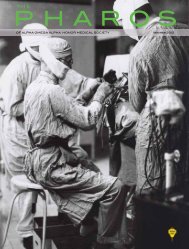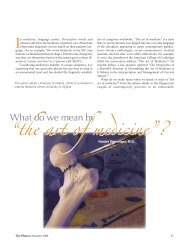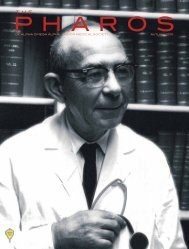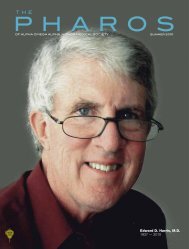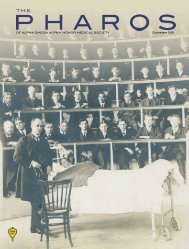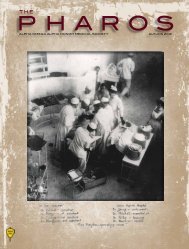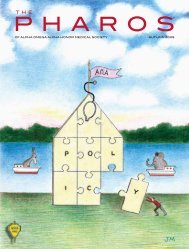4 - Alpha Omega Alpha
4 - Alpha Omega Alpha
4 - Alpha Omega Alpha
Create successful ePaper yourself
Turn your PDF publications into a flip-book with our unique Google optimized e-Paper software.
ng to forget<br />
cry. I listen to his heart but it doesn’t make any more sense<br />
to me than his occasional verbal sputters. I’ve only seen him<br />
open his eyes once in the week since his birth. He has thick<br />
and dark hair for his size, and it mats in tangled patches when<br />
he’s sweating. He sweats all the time. I sweat all the time.<br />
Zambia feels so hot lately. The baby smells like milk and baby<br />
powder and he attracts flies. I’m watching him die, so I try to<br />
pay attention to everything, I try to remember everything. I<br />
also try to forget everything.<br />
Sarah says he should have a name. I don’t want to give him<br />
a name.<br />
The baby sleeps with us some nights. He doesn’t move<br />
much at night, and his breathing is so quiet it sounds like<br />
two pieces of paper rubbing together. It is almost completely<br />
lost in the awful whine of the mosquitoes, so if he is sleeping<br />
we have to listen closely to be sure he is breathing. When he<br />
doesn’t sleep I sing to him. Sometimes I ask him not to die.<br />
Sometimes I ask him to stop suffering and die. We didn’t really<br />
adopt him, but his mother died at the clinic. She was the<br />
outside party in an extramarital affair. The teenage children<br />
of that family beat her to death when she showed up seven<br />
months pregnant. She lived long enough only to deliver her<br />
premature son. It probably doesn’t even make things any<br />
Illustration by Erica Aitken. Photo credit: Left, Flying Colours Ltd. Center, Roadsworth. Right, AFP/Getty Images.<br />
worse that he was born with her HIV infection, but I think<br />
about it because of the father, and the rest of his family.<br />
In the last week, when I see pregnant women or babies, I<br />
want to cry. Sometimes I do. I’m sad, of course, and also I feel<br />
very angry. I feel angry because I feel very helpless. I don’t<br />
know what I’m doing with these patients. I don’t know what<br />
I’m doing with this baby. I don’t know how to make a difference.<br />
I especially don’t know how to make a difference when<br />
the world around me looks so hopeless. And I don’t know<br />
how, once I leave here, I will ever close my eyes and not see<br />
the images of this world around me.<br />
Lesson for a student: There is healing<br />
strength in understanding death<br />
We left the clinic a little earlier than usual and drove together<br />
to the hospital where we would meet one of my mentor’s<br />
oldest patients, moving from hospital care to hospice<br />
care. Although my preceptor worked with pregnant mothers<br />
and pediatrics, the bulk of his practice was in the wider world<br />
of family medicine. He took great pride in treating as many<br />
as four generations of a family. He had pictures in his office<br />
of patients he has delivered and is now still treating in their<br />
twenties. With a patient population spanning such a spectrum<br />
of age, he was in a position to witness those great beginnings<br />
as well as to counsel those coming towards the great<br />
endings of their lives.<br />
The patient we were going to see had had a lifetime of reasonably<br />
good health and activity, now culminating in a week<br />
of shallow breaths and the feeling of pressure on her heart.<br />
To me this was one of the great hallmarks of the medical profession:<br />
the role of the physician at the end of life. What can<br />
you do to ease the frightening transition into noncorporeal<br />
existence? What tools of sympathy and empathy can you conjure<br />
up to achieve an effect of soothing compassion? What do<br />
you say to the family? What do you say to yourself about your<br />
abilities to preserve life?<br />
I wanted to save most of my questions until after our<br />
meeting with this patient and her family, but I talked a little<br />
The Pharos/Spring 2009 13




